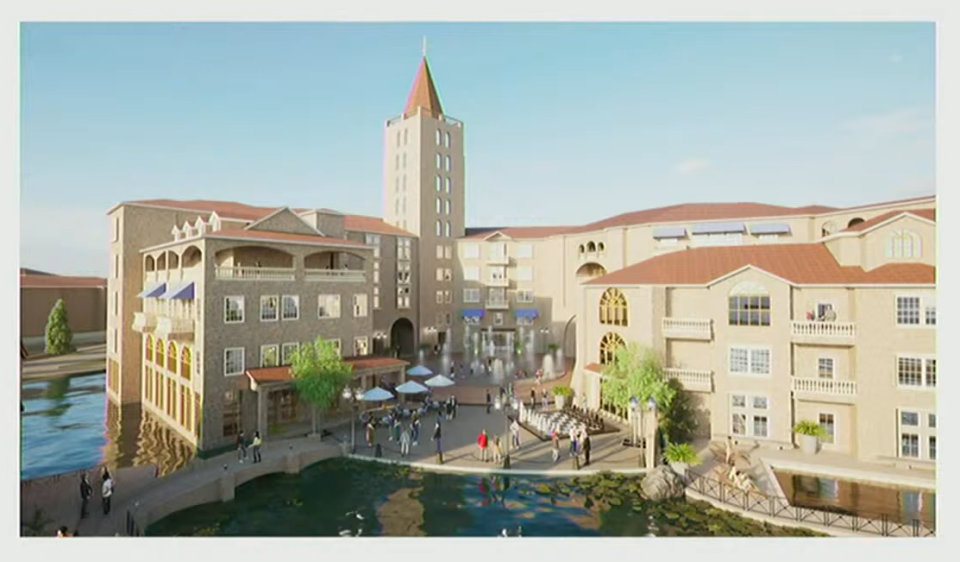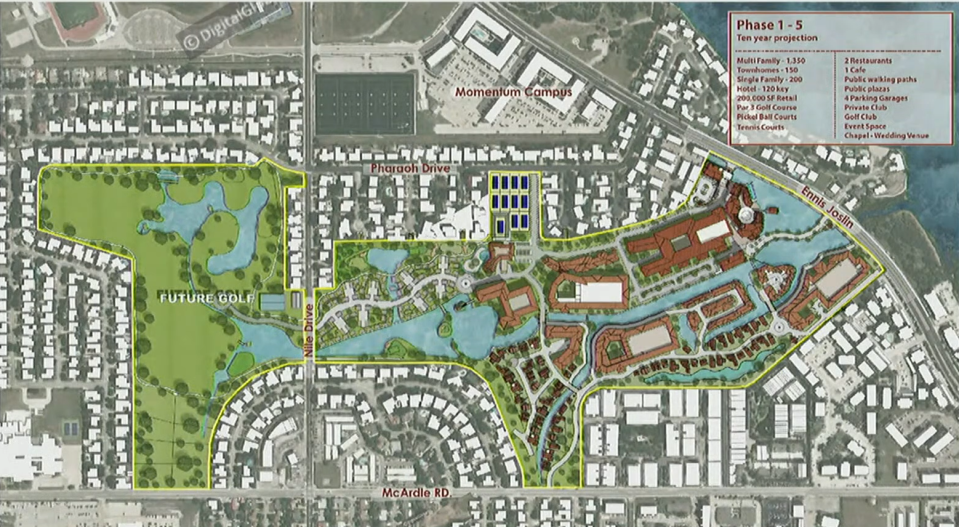Here's why a village-style development may receive tax dollars
A long-planned development inspired by an Italian village appears to be nearing construction on a former golf course.
Around late spring, bulldozers are anticipated to begin work on the site of the future mixed-use Barisi Village, said developer Jeff Blackard, CEO of Blackard Companies, as part of a presentation to the City Council on Tuesday.
Broad, preliminary plans for the mixed-use development include plazas, a bell tower and event space, coupled with residential options – anticipated to include more than 350 single-family homes and about 1,350 multifamily units – as well as retail space, sport courts, walking paths and a nature preserve, the city’s presentation shows.
Should the project reach conclusion, it would be a radical change to the profile of the parcel, where the Pharaoh Valley golf course closed more than 10 years ago.

“We feel like we can get this project done,” Blackard told the council. That’s why I’m standing here today.”
Tax reimbursements
The project update was included as part of Blackard’s request to the city Tuesday for creation of a tax increment reinvestment zone, known also as a TIRZ.
It’s an economic framework that designates an area in which a portion of the property taxes collected there are used to finance improvements within the bounds of the zone.

Blackard is requesting a reimbursement of about $82.6 million in projects for the development through tax increments, said Assistant City Manager Heather Hurlbert.
Generally speaking, development plans can change as build-out occurs – but currently included among projects requested for TIRZ financing are infrastructure work, public parking along with public spaces, such as plazas and tower, the nature preserve and sport courts, the presentation shows.
Under the proposal, the $82.6 million would be split among three taxing governmental entities – the city of Corpus Christi, Nueces County and Del Mar College, according to officials.
The ask to the city would have a ceiling of $44 million in reimbursements through tax increments for eligible projects over 20 years.
Background
Barisi Village was proposed nearly a decade ago and has been through a series of lawsuits primarily stemming from dispute over property rights and deed restrictions, which had originally called for the property to remain a golf course.
In part, the debate was generated over a then-new Texas law passed in 2015 that enabled deed restrictions to be amended through the signatures of 75% of adjacent property owners.
Prior to the legislation, support from 100% of adjacent property owners was required to change the deed restrictions.
Opposition by some nearby homeowners generally centered on the original deed restrictions – that the parcel remain a golf course – or in its absence, be preserved as greenspace.
Among other assertions, supporters contended would be a solution for what was then a feral, unkempt property that was dragging down property values.
Nearly 90% of neighbors approved changing the deed restriction, said Rev. John Hardie, who had helped circulate the petition.
“That’s a pretty good statement, of the people who voted,” he said.
City Councilman Jim Klein cautioned that “portions of Ennis Joslin (Road) cover a fairly extensive Native American burial ground,” and questioned how Blackard would respond on the off-chance that they were to “encounter remains like that going forward in this project.”
Surveys are performed on development sites, officials said, and if something were discovered, the project comes to a halt and authorities are notified.
Moving forward
Should the council decide to move forward with the request, next steps would include making potential modifications, followed by a public hearing, then brokering a development agreement on a project and financing plans, according to the presentation.
It’s anticipated it would take between 10 to 12 years to fully complete the five-phase Barisi Village development, according to the presentation – and at its conclusion a taxable value between $800 million to $1 billion.
More: Love North Beach? Here's what's new with Lighthouse Point Apartments, potential canal
More: Appellate court rules in favor of $300M Barisi Village project in Corpus Christi
More: What is Corpus Christi's Tax Increment Reinvestment Zone #3?
This article originally appeared on Corpus Christi Caller Times: Here's why a village-style development may receive tax dollars

